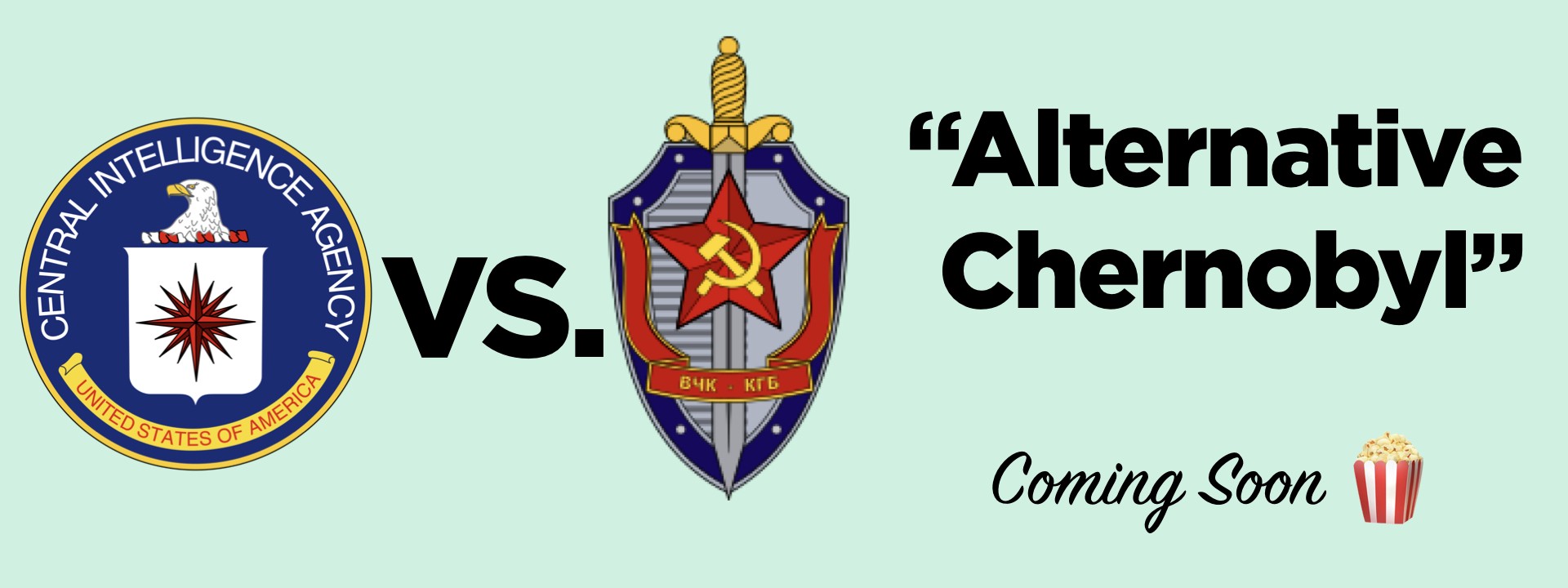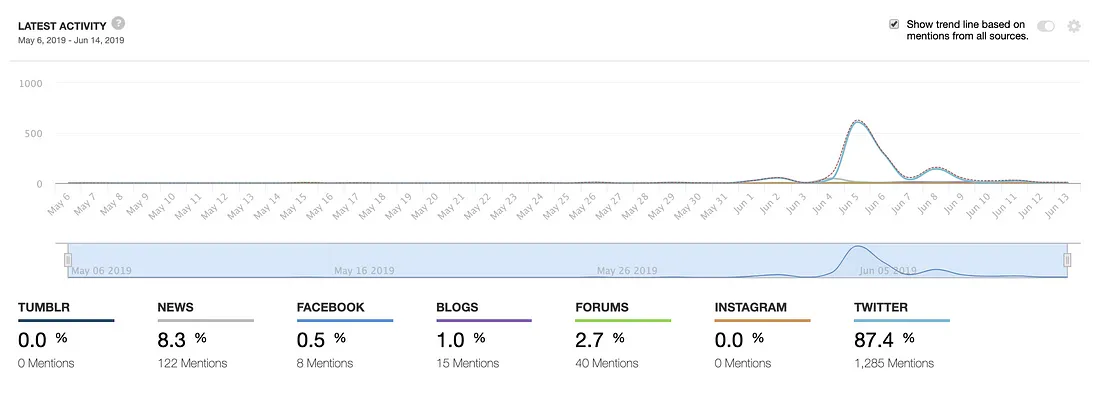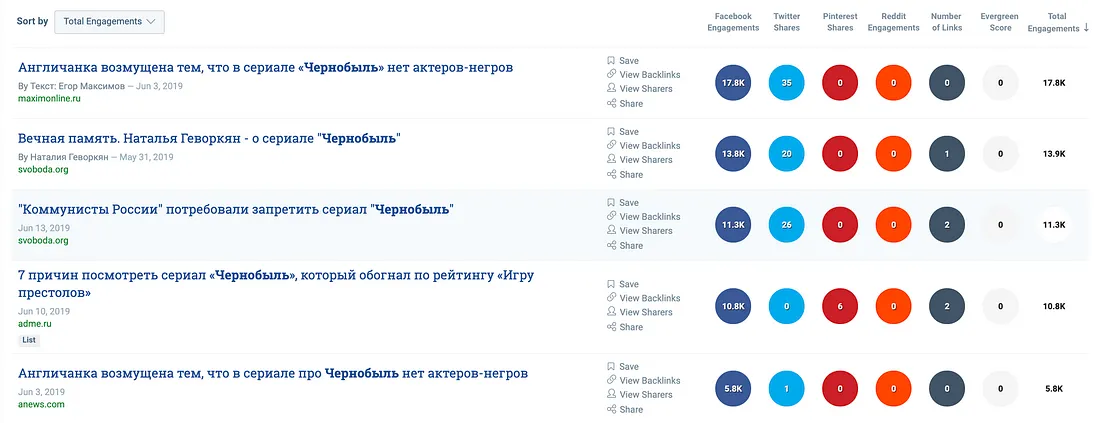For the Kremlin, HBO’s “Chernobyl” Hits a Nerve
How — and why– the Kremlin media mobilized against HBO’s account of the 1986 Soviet nuclear disaster
For the Kremlin, HBO’s “Chernobyl” Hits a Nerve

BANNER: (Source: @EtoBuziashvili/DFRLab)
The HBO miniseries “Chernobyl” began with a question: “What is the cost of lies?” The show dramatized the 1986 disaster at the Chernobyl nuclear power plant in the USSR and the Soviet leadership’s ensuing attempt to cover up the incident. The explosion in the Ukrainian city of Pripyat, which killed at least 31 people and left many more injured and suffering the effects of nuclear radiation for years to come, was one of the world’s worst man-made catastrophes.
Soon after its release, the “Chernobyl” miniseries — IMDb’s highest rated TV series in history at the time of writing — quickly became a target of the Kremlin media, which questioned the show’s historical accuracy on even the most of minor details and denounced it as American “propaganda” committed to tarnishing the image of the USSR. The show’s creators acknowledged that they took some creative license with the story, going so far as to document their changes in a companion podcast, though they based their story on multiple reliable sources, including first-person accounts. The Russian state-owned media’s fervent attempt to discredit the entirety of this mostly accurate historical account of the Chernobyl disaster indicates that the Kremlin still associates itself with the Soviet regime’s triumphs and failures and thus shares one of the latter’s chief vulnerabilities: its compulsion to dictate the historical record.
Kremlin Media Mobilizes Against the TV Series
On May 28, 2019, Russian-state TV outlet Russia 24 (Россия 24) dedicated the entire broadcast to criticism of HBO’s “Chernobyl” miniseries.
Stas Natanzon, a Russia 24 anchor, blamed the producers of “Chernobyl” for several historical inaccuracies. Among his complaints: some of the apartment buildings in the series had glazed balconies, which were virtually nonexistent in the 1980s Soviet Union; one of the main characters, Valery Legasov, did not commit suicide in the evening, but at noon; and the KGB did not silence academics and scientists from speaking publicly about the disaster.
Natanzon was particularly incensed by a scene depicting a meeting among Soviet officials in which they decided to keep the explosion secret from the public and bar the residents of Pripyat from leaving the city. Natanzon commented that Western society only associated the USSR with mass shootings, gulag prisons, and a repressive regime, so HBO simply could not fathom that the Soviet leadership cared about its people, hence the decision to quarantine the city of Pripyat. After “exposing” several more “historical errors” of HBO’s TV series, Natanzon assessed Chernobyl to be a mix of truth and lies — an ironic characterization, as the Kremlin media often blurs the line between fact and fiction to confuse and influence its audience.
Russia 24 was not alone in its criticism of the miniseries. Meduza, a Latvia-based Russian-language online publication, collected some of the critical articles from Kremlin-controlled media. These articles featured the following headlines: “A Wall of Lies: The ‘Chernobyl’ Miniseries Is an Excellent Propaganda Weapon;” “‘Chernobyl’ Is a Miniseries About Saving Your Own Skin, Not Your Soul;” and“Is the ‘Chernobyl’ Miniseries a Gift to Rosatom’s [Russia’s state nuclear company] Competitors?”
At the time of writing, Chernobyl is also the highest-rated TV show on KinoPoisk, a Russian version of IMDb, with a score of 9.1 points out of 10. The website does not include the miniseries on its list of the top 20 series, however.

Alternative “Chernobyl,” Alternative Facts
Russian-state TV channel NTV recently announced that it is planning to release its own series on the Chernobyl disaster, which was already in post-production when the HBO TV show aired. Its series will diverge sharply from the HBO account — as well as from historical consensus — by alleging that a CIA operative engineered the disaster, despite the best efforts of KGB agents to thwart him in the lead up to the catastrophe. The director of the NTV series, Aleksey Muradov, claims that the new series will recount “what really happened back then,” pointing to “a theory that Americans infiltrated the Chernobyl nuclear power plant.” The Russian Culture Ministry has reportedly donated 30 million rubles ($460,000) to finance the production of the series.
Following the release of the HBO series, the Russian Communist Party called for a ban on the series in Russia for “ideological manipulation” and the “demonization of the USSR” and threatened to sue its creators. For the Kremlin, censoring film or television that reflects unfavorably on the state is not a novel practice. In 2018, for example, the Ministry of Culture banned the political satire movie “The Death of Stalin,” labeling it “part of a Western plot to destabilize the country.”
Spread of the Conspiracy Narrative
To monitor the spread of the Russian conspiracy theory about CIA involvement in the Chernobyl explosion, the DFRLab scanned for mentions of the words “Чернобыль” (“Chernobyl”) together with “ЦРУ” (“CIA”) across online platforms in Russian using the online analytics tool Sysomos. From May 6 to June 14, 2019 — a period roughly overlapping when the series first aired — Sysomos registered only 1,470 concurrent mentions of both terms across all platforms.
The mentions started to increase on June 4 and peaked on June 5, the day the last episode of Chernobyl was released.

Of the mentions that Sysomos flagged as originating outside of Russia, 14 percent originated in Ukraine, 7.4 percent in Belarus, and 5.4 percent in the United States.

A BuzzSumo analysis of articles containing the keyword “Chernobyl” in Russian published between May 16, 2019, and June 15, 2019, showed that an article on the Russian-language version of U.S. entertainment platform MaximOnline received the most engagement on Facebook. The article, which had roughly 17,800 engagements, claimed that an Englishwoman was outraged by the fact that the TV series “Chernobyl” did not involve any black actors. The article with the third-highest engagements, at roughly 11,300, was published by Svoboda.org and concerned the Russian Communist Party’s call for a ban on the series in Russia.

As with Sysomos, a BuzzSumo analysis indicated that June 7, 2019 — two days after the broadcast of “Chernobyl’s” final episode — had the most engaged articles containing the keyword “Chernobyl” in Russian.

A Sysomos analysis showed that there was a significant uptick in mentions of the words “Chernobyl” and “CIA” in the month during which the HBO miniseries aired, while a BuzzSumo analysis showed that stories related to “Chernobyl” received moderate engagement across online platforms. The most engaged-with articles pushed two distinct narratives: first, a CIA operative orchestrated the 1986 explosion, and second, not featuring black actors in the series constitutes racial discrimination on the part of HBO.
Why did “Chernobyl” infuriate the Kremlin so much? In many ways, the leadership of the Soviet Union and the Kremlin are similar, and because of the parallels, the latter considers any attempts to expose the faults of the former as an existential assault on its own ideological foundation.
Follow along for more in-depth analysis from our #DigitalSherlocks.

